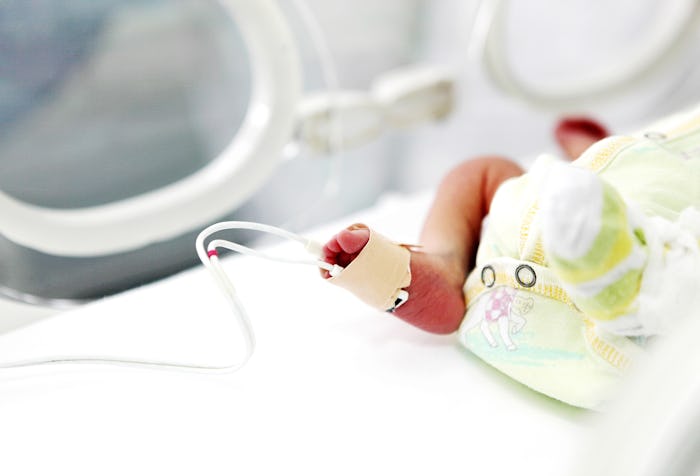Life

You're Gonna Get Pretty Hungry In The NICU, But There Might Be Rules About Food
Of my four children, three of them found themselves post-birth in the NICU. Blame it on extra-long deliveries that caused both me and my babies to spike a fever, but each one wound up having an unexpected stay in the hospital’s neonatal intensive care unit. It's a shocking and stressful experience, to be sure... after the shock and stress of having your baby in the NICU wears off, though, eventually your tummy will start to rumble (loudly at that), and you’ll begin to wonder if you can eat in the NICU. So... can you?
It really depends, according to Susie Taylor RNC-NIC, Associate Clinical Manager of the Neonatal Intensive Care Unit at Children's Hospital Colorado.
“There is no law on eating in a NICU,” says Taylor. “Individual units make the decision for themselves.” At the Children’s Hospital Colorado, for example, Taylor explains that parents only recently began to be allowed to eat: “We made the change to allow parents and families to eat in the room several years ago in order to provide improved family-centered care.” If, however, you're in a hospital that would prefer you nosh on sandwiches and salads elsewhere, you can always chow down in the hospital’s cafeteria or go outside and get some nourishment (and some much-needed fresh air).
Even if the NICU does give you permission to eat, you probably won’t be able to sit down to a three-course dinner there — nor would you want to. There might be a bunch of scary-looking wires and beeping machines attached to your baby, so the last thing you want to do is handle a hoagie in one hand and your newborn in another. Plus, there will be times that you won’t be able to eat in the NICU, even if it’s usually allowed. “During medical procedures, we ask that [parents] step out and take open food with them,” says Taylor.
Some hospitals might allow you to bring in your own food or even have it delivered. But don’t bank on storing your leftover chicken parm in the NICU's refrigerators. “The fridges in patient rooms are for patients’ breastmilk or formula only,” advises Taylor. Families can typically store perishable food in refrigerators located in family lounges. The reason: the food kept in your baby’s room might be limited by space, and “counters must be free to easily be cleaned," according to Taylor. Since eating in a NICU can be a safety issue, you might be asked to eat before or after a procedure is performed. After all, if your NICU nurse is trying to change a feeding tube, she can’t be moving aside your Chinese takeout containers to make space.
Even if your baby is in a NICU unit that allows you to bring in food, you should still be mindful about what kinds of tasty treats you choose. As delicious as that tuna fish sandwich might be, its aroma can get a little funky in your baby’s room — and annoy the NICU doctors and nurses. So skip the hard-boiled eggs or other foods that might qualify as an olfactory offense, and stick to foods that will be nourishing and easy to eat.
If your baby does have to spend some time in a neonatal intensive care unit, you should check with your hospital to know what to expect in the NICU, including its policies regarding eating there. But from my (sadly) vast and varied experience, you definitely won’t go hungry. The NICU nurses care just as much about the families (and in particular, the new moms) as much as they do about the beautiful babies in their care. If you’re hungry, they’ll make sure that you get fed or that you have ample opportunity to eat, too. That way, you won’t have to look longingly and lovingly at that Snicker’s bar in the hospital’s vending machines, and can enjoy a proper meal to sustain you while your baby is in the NICU.
This article was originally published on